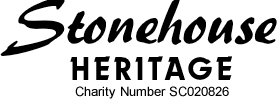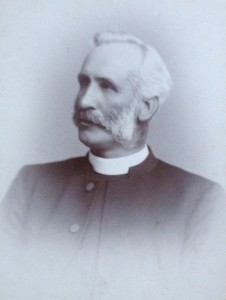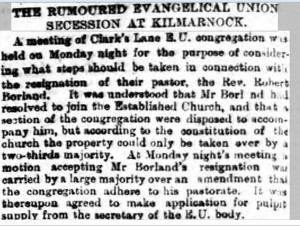Rev. Robert Borland
Born: 20th March 1849 at Milburn Cottage Dalserf
Died: 19th June 1919 at Yarrow
Son of Robert McDermot Borland (Brick and Tile Maker) and Margaret Kissock
In about 1843 Robert’s parents moved, along with two children, from Loudoun, Ayrshire to Stonehouse in Lanarkshire. In 1849 Margaret (Kissock) Borland gave birth to Robert, her sixth child, at Milburn in Dalserf. perhaps at a relative’s place as the family were by that time living at nearby Stonehouse where his father was continuing his trade of Brick and Tile making. Robert attended the Stonehouse Townhead Parish School where he received an excellent education.
Robert went on to graduate from the University of Glasgow in 1873 at the age of 23. He was ordained in October 1873 into the Evangelical church at Langholm.He spent four years at Langholm before accepted a calling to Kilmarnock in 1877, but in 1880 he resigned –It appears that he had proposed that his Evangelical church congregation go back to the Established church (The Church of Scotland) and they didn’t approve. Kilmarnock church along with many other churches in Scotland broke away from the Church of Scotland in 1843 to become the United Free Church, the Evangelical Union church, United Presbyterian church, Burgher and Anti-Burgher churches, and so on. This is well documented and was called “The Disruption”.
Perhaps having given them an ultimatum and with every intention of joining the Church of Scotland himself, he was left with no option but to resign.
Dundee Courier 14 April 1880 Resignation from Kilmarnock Parish.
Robert Borland’s Publications –
Ten Days in Norway (Kilmarnock, 1887);
Yarrow: its Poets and Poetry (Dalbeattie, 1890); 2nd ed., Galashiels, 1908);
A Word in Season (Private circulation, Selkirk, 1895);
Border Raids and Reivers (Dalbeattie, 1898; 2nd ed., 1910) edited James Hogg, the Ettrick Shepherd (Memorial vol.; Selkirk, 1898);
“The Ecclesiology of Yarrow” (Trans. Scot. Eccles. Soc., 1906); “The Religious Significance of Yarrow”(The Guide, Feb. 1906). – (The Border Magazine, May 1907
Stonehouse – Townhead Primary school.
The Borland Medal/Dux.
On the 6th June, 1924 the Headmaster of Townhead Primary School, Mr. A. McIntosh, wrote in his diary “I have received word from the Authority that a Gold Medal (from money left by the late Dr. Borland, Yarrow) is to be awarded to the Dux Scholar” i.e. the best scholar in the Senior year. The first medal was awarded to Robert Mitchell in 1924. This practice continued each year until 1936 when the rising price of gold made this practice difficult to continue so a watch or other prize was awarded instead until 1939 when a gold medal was again awarded during the war years until 1944. In 1946 it again became difficult to obtain a gold medal so War Savings Certificates were awarded in 1945/6. A prize was awarded each year until 1950 after which the practice ceased (or at least went unrecorded). It was revived in 1960, until 1967 then again discontinued between 1968 and 1980. The Borland Medal prize was revived again in 1981, until 1984 then again, no record between 1985 and 1992. The practice was revived again by Mrs. McKenzie, the Head teacher, in 1993 as the Borland Prize for Endeavour. This continued until 1996 and then nothing further is known.
John Young, a local historian in Stonehouse kindly sent me a copy of the school log listing of the Borland Medal winners and runners up.
Information provided by Anne Simpson 2014


